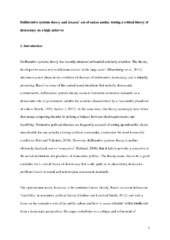Deliberative systems theory and citizens’ use of online media: testing a critical theory of democracy on a high achiever
Peer reviewed, Journal article
Accepted version
Permanent lenke
http://hdl.handle.net/1956/22957Utgivelsesdato
2020Metadata
Vis full innførselSamlinger
Originalversjon
https://doi.org/10.1177/0032321719890809Sammendrag
Deliberative systems theory is a promising candidate for a normative theory of democracy that combines ideal requirements with feasibility. Yet, recent theoretical elaborations and studies of citizens’ online media use inspired by the theory suffer from an incomplete account of the public sphere’s epistemic function, too rough interpretations of participatory levels, shortcomings in the understanding of online media, and a context-insensitive notion of policy reform. Addressing these weaknesses, the article argues for a refined version of deliberative systems theory. Particular attention is given to feasibility considerations. Reviewing studies of online democracy in Norway, the article shows that the theoretical critique has practical significance. It is also argued that the amended version of the deliberative systems approach produces a diagnosis of Norwegian online democracy more in line with reasonable expectations to a high achiever. This is taken as a prima facie indicator of feasibility.
